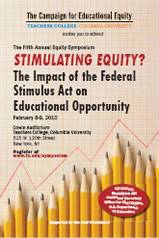Equity Symposium Asks: Where Is $100 Billion in Education Aid Going?
States are using federal stimulus money intended to promote innovation and equity reforms in schools to instead plug holes in education budgets ravaged by the economic recession.
That’s the finding of at least one major study that will be presented at “Stimulating Equity? The Impact of the Federal Stimulus Act on Educational Opportunity,” a symposium that will be held at Teachers College, Columbia University on February 8th and 9th.
The event convened by the College’s Campaign for Educational Equity, is the first major national symposium to analyze the impact of The American Reinvestment and Recovery Act (ARRA), which is enabling the U.S. Department of Education to distribute $100 billion to states over the next two years for public schools suffering from the effects of the recession.
The symposium will discuss whether this windfall of federal cash – more than double the Department’s 2009 budget – will improve equity and opportunity for low-income students. The two-day event will take place on February 8 and 9 in Teachers College’s Cowin Center at Teachers College, located at 525 W. 120th Street, in Manhattan. The papers will be available online at www.tc.edu/symposium beginning February 8.
The keynote speakers at the symposium are Pennsylvania Governor Edward G. Rendell, who has insisted that funding for educational equity provisions in his state continue as scheduled despite the current economic downturn; and Russlynn Ali, Assistant Secretary for Civil Rights, U.S. Department of Education, who is responsible for enforcing civil rights law in schools. Susan H. Fuhrman, President of Teachers College and a prominent national scholar of education policy, will moderate a panel of state education commissioners, including Mitchell Chester of Massachusetts.
When Congress passed ARRA last February, one intent was certainly to stabilize education funding. But its other aims were to continue equity and adequacy reforms, and promote education reforms to boost student achievement.
“Our initial analysis indicates that stabilization may in some cases have been unduly emphasized at the expense of the equity and reform goals of the ARRA,” said Michael Rebell, founding director of the Campaign for Educational Equity and organizer of the annual symposium. “Some states apparently increased their anticipated education deficits upon learning that substantial federal funding for education was in the offing in order to avoid planned cuts in other areas of the budget.”
At the symposium Rebell, who is an attorney, will deliver a paper arguing that, even in a recession, states are legally required to continue to equalize educational opportunity for all children. “Children’s constitutional rights are not put on hold because there is a fiscal crisis,” he said.
Also at the symposium:
- Jack Jennings, president and chief executive officer of the Center on Education Policy, will deliver the results of a survey of state officials by his organization. The officials reported that, of the federal money they planned to use to fund education reforms, most of it will go toward developing data systems for tracking students’ progress and for adopting more rigorous academic standards and assessment. Less money will be spent on improving the effectiveness and distribution of teachers and turning around low-performing schools – two indicators of how well they anticipate serving low-income children and communities.
- Maris Vinovskis, professor of history, University of Michigan, will deliver a paper on the expanding role of the federal government in education.
- A session on handling budget shortfalls in New York State will include Photeine Anagnostopoulos , Chief Operating Officer, and Alison Avera, Deputy Chief Operating Officer, of the New York City Department of Education; Dan Lowengard, Superintendent of the Syracuse City School District; Mary Anne Schmitt-Carey, Executive Director of Say Yes to Education in Syracuse; Glynda Carr, Executive Director of Education Voters of New York State; and Geri Palast, executive director of the Campaign for Fiscal Equity.
To register to attend the symposium, please visit www.tc.edu/symposium or call Jessica Garcia at (212) 678-8362.
Published Tuesday, Jan. 26, 2010
